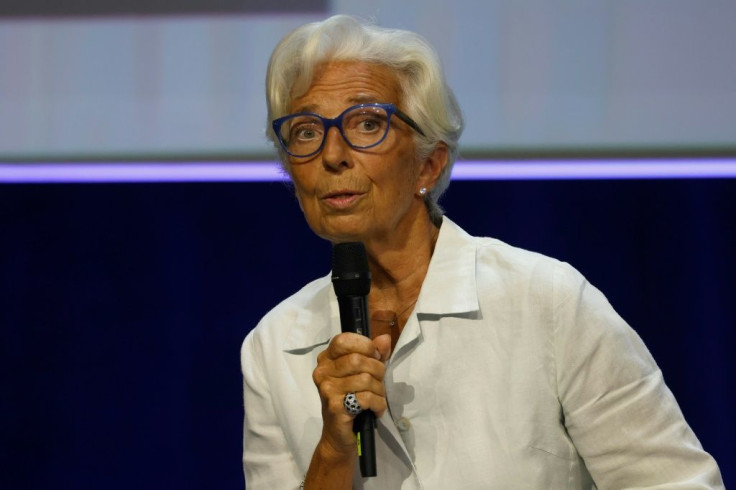ECB Slows Pandemic Stimulus But Warns 'Not Out Of Woods'
The European Central Bank took a small step towards scaling back pandemic-era stimulus Thursday, but sought to reassure markets of its ongoing support as president Christine Lagarde warned that the eurozone is "not out of the woods" yet.
"The euro area economy is clearly rebounding. However, the speed of the recovery continues to depend on the course of the pandemic and progress with vaccinations," ECB chief Christine Lagarde told a press conference in Frankfurt.
The ECB's 25-member governing council decided at its six-weekly meeting to slow the pace of its massive monthly bond purchases, as economic activity bounces back and inflation surges higher.
The 1.85-trillion-euro ($2.2 trillion) pandemic emergency bond-purchasing programme (PEPP) is the ECB's main tool to cushion the impact of the coronavirus crisis and is aimed at keeping credit cheap in the 19-nation currency club.
Lagarde said the reopening of economies as coronavirus curbs eased led policymakers to judge that "favourable financing conditions" could be maintained with a "moderately lower pace" of PEPP purchases than in the previous two quarters.
The ECB did not, however, change the size of the scheme nor its end-date, set for March 2022.
"We're not there yet. We're not out of the woods," Lagarde said, stressing the bank's flexibility in shoring up the euro area.
Like central banks everywhere, the ECB faces the delicate task of deciding when and how to remove stimulus without jeopardising the recovery.
Lagarde was at pains to stress that the slower PEPP pace did not amount to "tapering", or the beginning of the end of the bank's pandemic support, at a time when the Delta variant is pushing up infection numbers.
"The lady isn't tapering," Lagarde told reporters. "We have not discussed what comes next and this is something for which we will prepare in the months to come."
In the United States, the Federal Reserve has signalled it could start withdrawing stimulus measures by the end of the year. But recent disappointing data has raised doubts about the timeline.
"The ECB postponed the big decisions about a genuine shift in its stance to its December meeting," said Berenberg Bank economist Holger Schmieding.

The ECB has since March been buying up debt at a "significantly higher" pace compared with the start of the year, which analysts said amounted to around 80 billion euros a month.
The PEPP pace over the fourth quarter could now fall back to 60-70 billion euros monthly, according to analysts.
The ECB left the rest of its ultra-loose monetary policy unchanged, which includes a pre-pandemic bond-buying scheme and interest rates at record low levels, all designed to spur spending and investment.
Lagarde said the measures were "key" to supporting a sustainable recovery and pushing inflation closer to the ECB's two-percent target.
Eurozone inflation soared to three percent in August to reach a 10-year high, fuelled by one-off effects linked to the pandemic and global shortages of materials like semiconductors, plastics and steel.
But Lagarde reiterated that the ECB sees the consumer price hikes as temporary and that medium-term inflation was forecast to remain "well below" target.
Data this week showed that the eurozone economy grew by a better-than-expected 2.2 percent in the second quarter as lockdowns ended.
The ECB expects the euro area economy to grow by five percent this year, up from 4.6 percent previously.
While Lagarde described the risks as "broadly balanced", she warned that the Delta variant could "delay the full reopening" of economies.
Likewise, supply chain bottlenecks could last longer and price rises could be "more persistent" than expected, she said.
Lagarde also noted there were still two million more people unemployed than at the start of the pandemic.
The bank sees inflation jumping to 2.2 percent this year before falling back to 1.7 and 1.5 the following two years.
By adjusting its bond purchases and acknowledging inflation risks, the ECB is "finally catching up with reality", said ING bank economist Carsten Brzeski.
© Copyright AFP 2024. All rights reserved.





















